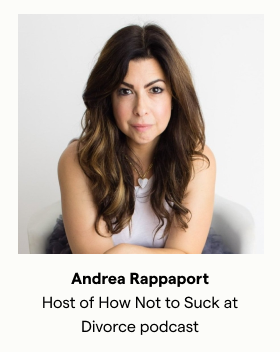What to Do Before Separation or Divorce: Everything You Need to Know
If you’re planning to separate from your spouse or partner (or you’re just considering it), you might feel overwhelmed. It could be a long, complicated process. These guidelines will help you start off on the right foot.
This advice is based on my 22 years of observing families, and empathizing with their struggles, while practicing family law. It also includes advice and observations from Dr. Samantha England, a child therapist, and Andrea Rappaport, the host of the podcast How Not To Suck At Divorce.
“The biggest thing that people need to do is make a mindset change,” says Andrea Rappaport, host of the podcast How Not To Suck At Divorce. “This person in your life was your partner, in all senses of th e word. You've obviously gone through a breakdown in that relationship. The challenging part is that you don't get to get rid of them completely.”
e word. You've obviously gone through a breakdown in that relationship. The challenging part is that you don't get to get rid of them completely.”
You’ll be parenting separately, but you’re still both raising the same child. “Essentially, you are turning into a very funky business partner. The two of you are in the business of raising these children together, and for most intents and purposes, there is no way around it.”
You’re not adversaries
“You can't look at it as if this person is your adversary and you’re going to eventually take them down,” says Rappaport. “That's going to set you up to fail. And it's going to set you up to spend a ton of money. You're going to go through a ton of stress, and your kids are going to feel every single minute of it.”
It sounds simple, but it gets complicated. “Even in cases where there's been abuse, you still have to look at it like this: ‘I'm in the business of raising children, and this is the person whom I procreated with. Therefore, unless the court deems otherwise, I have to raise these children with this person.’”
Rappaport makes a comparison. “There are always people who work together in offices who don't always get along. You don’t need to be best friends with this coworker, but you have to be able to work with them.”
Be realistic
“Anytime you correspond with your ex, you have to think, ‘How is this going to impact my kids? Is this going to make their lives harder or easier?’” asks Rappaport. “And if you're about to do something that can make your kids’ lives harder, then you have to stop and choose a different option.
“It’s an unpopular opinion that people don't want to talk about. People think that there's some sort of magic formula for ‘how to get a divorce in the easiest way possible,’ and that just doesn't exist. If it did exist, there wouldn't be a million books written about divorce. We wouldn't have a podcast about divorce. You wouldn't have people becoming divorce coaches and attorneys.
Rappaport concludes, “There's no easy way to get divorced.”
Sadly, your co-parent is unlikely to make drastic changes to their lifestyle or parenting style as a result of the divorce or separation. Expecting a major change will only hurt you.
“Are you asking your co-parent to do things that you know they're not able to do? You've been married to this person, so you know their limitations,” Rappaport points out.
“Let's say you're married to somebody who's very unorganized. You have to know that when you divorce this person, they're not going to all of a sudden become super organized and the kids are always going to come to you with their backpacks clean and their clothes ironed. That's just not going to happen. So you need to have that realistic expectation, and also don't try to change it. Have a realistic expectation of what your co-parent can do.”
Separate feelings from responses
Although emotions can be overwhelming and impossible to silence, “Your behavior is something that you have control over. So I might feel a certain way about my ex-husband until I no longer organically feel that way. But I get to choose how I'm actually responding to him,” explains Rappaport.
“It’s like having a bad boss. This person is a terrible person, but until you quit that job, that person is your boss. You have to figure out how you're going to deal with it. The mindset is on you. It's not about changing the other person.”
Even though emotions can run rampant during a separation, that’s a separate issue. “I don't care if you like them or not. It's that you have to deal with them,” says Rappaport.
“You have to think, ‘Am I asking this person things in an inflammatory way?’ And what's really hard is that you're going to have a lot of big feelings, especially when you're going through the divorce process. But you have to think, ‘How am I still going to make sure that we can raise these kids together, even when we're going through something very challenging?’
Even with that mindset, you will probably be extremely frustrated at times. “It's sort of like, if a child throws a temper tantrum and throws a plate at you, you don't throw the plate back at the child, right?” asks Rappaport. You pick up the plate, and you say, ‘We don't throw plates in this house,’ but then you go right back to doing what you were doing.
“If they're acting like a child, then, naturally, you're going to start thinking of them as a child. I can't tell you how many times I’ve had to say to myself, ‘He's having some really big feelings right now.’ So separate your feelings and your partner's feelings from how you respond to them.”

Focus on the 5-year mark
Your emotions might seem chaotic at first, and your co-parent’s might seem even worse. But it’s normal to realize that feelings are nonlinear—they don’t follow a straight path in one direction. Instead, they go up and down like a roller coaster, says Rappaport.
But that doesn’t mean the roller coaster will last forever.
“When you are in the thick of it, things are really bad and really ugly, and when you're at the beginning of it, you have to tell yourself, ‘I'm going to go through a phase where things are going to feel really hard, and it is going to get better,’” recommends Rappaport.
“There are ups and downs. There are moments where you might say, ‘Okay, things are working. I haven't received any nasty text messages this week,’ and then it could take another dip. So it's up and down for a while, until usually about 5 years out. It might feel like a long time, but at least there's an endpoint.”
Half that roller coaster is under your control, explains Rappaport. “It's also important to look at the role that we play in this, which is an unpopular thing to talk about. Everybody wants to look at this like ‘My ex, my ex, my ex, my ex.’ But a lot of this is probably on us. It's what we've put out there. It's what we've done that has inflamed certain situations.
“But you are a lot calmer in 5 years.
“Usually, in 5 years, both parties have moved on in some ways. Maybe they're in other relationships, or they're just in a different season of their life, so it doesn't feel as heavy as it once did.”
It helps a lot to know the intensity of the situation can fade over time. “You're doing this because your end goal is to get to the other side of the rainbow, where things are happier and healthier,” says Rappaport. “But in order to get there, you’ve got to go through the storm. So you're walking through a rainstorm, but you know that rain showers don't go on and on forever, and neither will this conflict.”
It’s crucial to understand your state's child custody laws before separating. Every state is different! Make sure you know the difference between physical versus legal custody and the difference between joint custody versus sole custody. You don’t need to be as educated as a lawyer, of course, but a general understanding will help you navigate as you move forward.
It also helps to get familiar with the different custody schedule splits:
And check out the most common custody patterns, too—like 2-2-3 or 3-4-4-3. But there are a lot of options for each custody split.
If you enter the separation prepared with options and plans, it will likely be a smoother process.
Should you really consult an attorney or a mediator at this stage? Yes!
What if you’re just considering a separation and you haven’t decided yet?
Even at the pondering stage, consulting an attorney could help tremendously. An attorney can tell you what documents you need to get, so you can start gathering them (like financial records, banking information, and tax returns). An attorney is going to ask you things like, “Is your name on the bank account? Do you have access to funds?”
Even if you don't ultimately use it—if you don't go through with the whole process of divorce or separation—just knowing where that stuff is and having access to it can bring peace of mind and protect your options.
Some attorneys offer a free consultation. If you’re low income, ask for a sliding scale. If your workplace offers an EAP program, look into it. If you ask friends for a referral, you might get a free consultation because of the referral.
Divorce is a hard time for everybody. A therapist won’t give you legal advice, but they can help you think through your emotions, your options, and your decisions.
In most separations, you can’t completely avoid conflict. When you face the inevitable problems, you need to talk about them. 
Dr. Samantha England, Psy.D, explains her process. “In session, we practice: ‘Okay, let's take an example of something that's been a conflict between you two.’ Who's moving out? What are the next steps? When are we getting attorneys involved?’ And we'll practice that. It's nice to have a third party to point out things that the other person may not be aware of, like maybe you're saying it in a certain tone.”
Ultimately, “It is about the child,” says Dr. England. “Research tells us that when parents are separating, it’s the conflict that really impacts the child, not so much the divorce or separation itself. So it’s about really trying to limit that conflict. And if it does arise, it’s all about keeping it away from the child.”
Talking with a therapist gives you an alternate way to vent your feelings—far out of earshot of your kids.
It doesn’t hurt to get your children in therapy, either, so they have an established therapeutic relationship before they deal with a major life change.
“Documentation matters—even pre-separation,” says Rappaport. “Especially if your relationship is high conflict.
“If you are in a situation where things are getting really rowdy, like really, really challenging, then you're tasked with documenting, which is where utilizing OurFamilyWizard comes into play. It's that mindset of, ‘I'm documenting so that it's there for safekeeping, for if this gets really out of hand, in case I need to take legal steps.’”
Simply documenting things doesn’t guarantee you’ll go before a judge. But it can serve as a layer of protection just in case.
Most of the time, judges aren’t concerned if there’s inappropriate behavior, even abusive behavior, just between you and your spouse. But if it happened in front of your children, or if the children themselves are being abused, absolutely document that.
“Let's say Mom has some big issues, and Mom has forgotten to pick up the kids at school multiple times, or there's been a pattern of neglect,” says Rappaport. “Those are things that you want to have documented. But not the petty stuff—that's really not going to serve you, and it also puts you in that mindset of working against this person and not working with them.”
Rappaport recommends documenting this too: “If you’ve been the parent that has done all of the things for the kids—meaning, for example, that your soon-to-be-co-parent isn't aware of any of the activities going on at school.”
You can even introduce OurFamilyWizard prior to divorcing or separating, just to stay organized and minimize miscommunication. You can use OurFamilyWizard to establish good habits, maintain clear communication, and ensure that the needs of the children are met.
You're way ahead of the game if you're doing that. You're going to set your whole family up for success by getting organized from the get-go. Plus, having a clean record never hurts.

It’s difficult, but communicating respectfully with your spouse makes a big difference in the separation experience. Even though you're going through a separation, respectful communication benefits both the kids and your co-parenting relationship.
“Remember that anytime you are communicating with your ex,” says Rappaport. “You have an objective, you have a reason for communicating. What is that reason? And are you communicating in a way that's going to help you get what you want?
“Don't be a jerk,” Rappaport adds. “You're not going to get what you want. If you've been documented as being somebody who's inflammatory and high conflict and a jerk, the judge isn't even going to like you, because it looks like you're the one causing all the problems—because you are.”
OurFamilyWizard helps establish a sense that polite communication is normal. Because all communication is on the record when you use the app, people are often on their best behavior.
You want to maintain consistency for the kids, so as much as possible, stick to the same household rhythm, or keep the same school system, because kids thrive on stability.
That's not always possible—some people have to go live with relatives, for example—but maintaining the kids’ schedule should be of utmost importance. Minimize disruption to the children's lives by maintaining their living arrangements and school.
Setting a consistent schedule reduces anxiety for the children. Children thrive on schedules and routines.
This is a crucial step, but it comes with a lot of misgivings. Most parents aren’t sure how they should handle the situation.
How to tell your child you’re separating or divorcing
Have an age-appropriate conversation with your child about what's going to happen, so they're not surprised. Avoid giving too much detail, because they don't need to know adult content or adult information. Sit down and have a conversation about what might be happening with the household, or how mommy and daddy are moving forward.
Parents should be very mindful not to bash the other parent. That should go without saying, because it's just the right thing to do, for two reasons. One, that person is the parent of your child. Two, what if you get back together? The child has heard that terrible information, and now, all of a sudden, you're back together. That puts your child in a painfully awkward position.
When to tell your child you’re separating or divorcing
If there's going to be a situational difference, like a housing change, or if Dad or Mom is moving out, tell your kid first. The conversation has to start before that—before the kids see a parent with their suitcase walking out the door.
Even if you phrase it as, “Mommy and Daddy are going to do a trial separation, or we're going to try living apart, or we need a little break,” it still has to happen before a parent leaves.
Let your kids know you’re available, so they can come to you with questions. Respond to those questions calmly and thoughtfully, so they know it’s safe to talk to you about this.
What to avoid when you tell your child you’re separating or divorcing
Don't make the kids choose a favorite parent. If you are separated or going through a trial separation, encourage the children to call or visit the other parent. Never make the child feel like they have to choose—that’s traumatizing in the long term. They'll be in therapy for 20 years for that.
There isn't a magic age where a child gets to decide which parent they want to live with. At least in Arizona, there's no specific age where they're legally allowed to choose. Parents often say, “Well, I heard that at age 12 or 13, kids can choose” - but that's a misconception. A child doesn't have the final say until they turn 18 and are legally considered an adult.
Until then, the court considers many factors, including the child's maturity and best interests, but ultimately, the decision rests with the judge. Children aren't yet in a place developmentally to carry the weight of that decision on their own. Their preferences can be shaped by things like which parent has fewer rules, access to video games, or even a more comfortable home - not necessarily what's in their long-term best interest.
Being asked - directly or indirectly - to choose sides can place an immense emotional burden on a child. It's important for parents to remember that even subtle pressure can cause a child to feel conflicted, anxious, or guilty. Protecting children fro these difficult dynamics allows them to adjust more healthily to the changes in their family structure and focus on simply being kids.
Stay calm and make yourself available for your kids, so they can let you know how they're feeling without worrying that you’ll badmouth the other parent in response. Just take in the information they share and validate what they're feeling. That’s the most important thing your kids need from you during the separation process.







